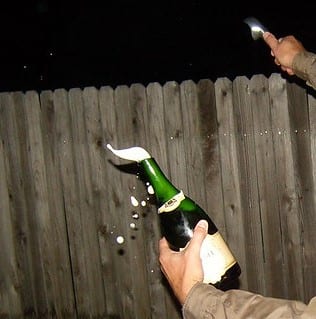Fill Your Lamps, Church – Let’s Be Ready! Post-election Sermon

Whether you’re celebrating or mourning the election, we must not become complacent. There is much work ahead – for our communities, our nation & the church. This post-election sermon was preached for St. Thomas Lutheran Church in Lexington, Kentucky.
Biblical texts: Joshua 24:14-25; Matthew 25:1-13
Last week was All Saints Sunday, the Sunday before the U.S. election. It was a fraught time, and we had no idea how things would unfold. But you may recall that I said these words in the sermon.
We will come together to help lead our communities through a time of uncertainty. We will call our neighbors to love each other. And we will condemn all forms of political violence following the election. We’ll insist that every vote be counted and that the government ensure a peaceful transfer of power if one is needed. It is our shared duty to protect our democracy. We all want to make this country better. So this is an opportunity for us to move forward with fairness, dialogue, and respect.
We have the assurance of God’s presence. And we have faith that “the Lamb at the center of the throne will be their shepherd, and he will guide them to springs of the water of life, and God will wipe away every tear from their eyes.” With calm, patience, non-violent resistance, and justice, we can bring the horrific “Night on Bald Mountain” to an end.
Now here we are, seven days later, and what a rollercoaster it has been!
The nauseating up-and-down of emotions ranging from hope to fear, all the while recalling the trauma of the 2016 election. The long nights and days watching the vote counts, as we teetered back and forth between optimism and despair. But even before we knew the official results, there were some very positive things that happened in this election.
First, everything proceeded as it should in a democracy. Our democracy worked the way it’s designed to function.
Second, we learned some important things. We learned that we can vote in a pandemic. We learned that the threats of violence did not materialize to the degree that was feared, thanks be to God. And we learned that people came together in really positive ways to encourage each other while voting.
I was especially heartened to see clergy and congregations supporting the democratic process in myriad ways.
From phone-banking, to working the polls, to registering voters, to handing out drinks and food for people waiting in line to vote. Not to mention the many prayer vigils that occurred during and after Election Day.
Then yesterday at 11:25 a.m., the Associated Press called the U.S. presidential election for former Vice President Joe Biden and Senator Kamala Harris after confirming that they had surpassed 270 electoral votes.
Suddenly there were celebrations bursting across the nation! Like a champagne bottle that pops from all the pressure built up inside — finally there is release! The outpouring of joy and exuberance bubbled over into the streets as people of all colors, creeds, and cultures joined together in relief and rejoicing.

This is a time to celebrate! Just as Miriam and the women sang and danced in jubilation. Just as David danced before the Lord. And just as Jesus’ mother Mary sang a song of resistance and joy in God’s deliverance.
As a faith leader, I have to note the vast network of clergy and people of faith who helped get us to this point.
The faith community came together to support democracy in a powerful way during this election. Their efforts helped to ensure a free and fair election. We need especially thank the clergy and churches of color whose monumental efforts to get out the vote made all the difference in this election. We must continue to follow their lead, listen to their voices, and trust their wisdom and experience for organizing houses of worship and communities in the midst of oppressive systems and institutions that remain firmly entrenched.
As my friend and colleague Rev. Stephen Fearing reminded me yesterday, we need to fill our lamps and be ready.
The next several weeks leading up to the inauguration will be a particularly dangerous time for immigrants, BIPOC (Black, Indigenous, People of Color), LGBTQIA, and people of faith who are not Christian. “Clergy and Christians need to be prepared to step into spaces to protect any of God’s children who are threatened by hurtful rhetoric, threats, or violence,” he said. “No matter whether congregants are celebrating or devastated by the election results, we can certainly all agree that we want to see a peaceful transition of power, just as our country has done for 240 years.”
As we listened to the newly-elected president and vice-president speak to the nation last night, we heard the reassurance that is so necessary for this time. They delivered a message of healing and hope for our country that we so desperately need.
Even as we celebrate, however, we must not be complacent.
White Christian nationalism will not magically go away, so our faithful witness to the gospel must not fall asleep. Like the wise bridesmaids in the parable, we must keep our oil lamps filled and our wicks trimmed. We must be ready. We’re accountable to the ‘least of these’ who were oppressed before and during Trump’s time in office and will be continue to struggle after he leaves.
We also know that disinformation is continuing.
Social media platforms have allowed disinformation to propagate on their sites. They are not being held accountable. This breaks the commandment not to bear false witness, and the church needs to call this out. Lying and falsities ruin relationships and destroy how we function as a democracy.
At the highest levels of government, the past four years have seen a normalizing of lying, cheating, gaslighting, criminality, cruelty, and systematic dismantling of social norms and governmental accountability. Unfortunately, a precedent has been established that future leaders may take advantage of unless serious protections are codified. This means that the faith community must take a role in re-establishing ethical norms based on honesty, trust, and accountability.
At the same time, Christianity in America is going to need a come-to-Jesus process to interrogate our white supremacist foundations.
The church MUST tell the truth about the part it has played in either fomenting, ignoring, or being silent about racism and the other isms structured into our society and institutions.
Joshua’s challenge to the Israelites as they entered a new phase of their life in community together is a challenge to us as well: “Choose this day who you will serve” (Josh. 24:15). Which God are we truly worshiping? The god of wealth, privilege, and whiteness? The god of power, control, and dominance? Or the God who commands us to care for the orphan, widow, foreigner, the planet, and “the least of these”?
I’m so glad to see this church, St. Thomas, asking the difficult questions and taking up the task of addressing racism.

You’re reading and discussing the book I’m Still Here by Austin Channing Brown. That’s a good place to start. Next steps might include taking action to help dismantle racist structures in our community and own denomination which is 97% white. This has to happen from the top-down and from the ground-up.
From the ground-up, it means doing the deep, inner work of deconstructing our white worldview and allowing God to reconstruct it in a way that decenters our whiteness and re-centers people of color.
It means listening to them, believing them, trusting them, and stepping aside so that they can lead – which they have proven for centuries they can do. We saw this especially in this election. From Vice President-elect Kamala Harris to Stacey Abrams, to the late great John Lewis and Elijah Cummings, to Corey Booker, to Andrew Yang – there is a rainbow of highly qualified, competent folks ready to bring their experience and expertise to the task of improving the lives of all Americans.
What might it look like to dismantle racist structures in our community?
It means joining with local organizations that are doing this work. Organizations like the Poor People’s Campaign that address the intersections of race, poverty, environmental degradation, and the war economy in order to redress the wrongs that are causing harm.
The PPC is “building up the power of people and state-based movements to serve as a vehicle for a powerful moral movement in the country and to transform the political, economic and moral structures of our society.” So this church may want to be a part of that work. There is a local chapter right here in Kentucky, and many Lutheran churches are already joined in with this powerful network for positive change.
What will deconstructing racism look like in our own denomination of the ELCA?
My colleague Rev. Nelson Rabell, a Latinx Lutheran pastor in California, reminded me that the church needs a kenosis. Kenosis is a Greek word that means “to empty.” It’s the word Paul used in Philippians to describe Jesus emptying himself of his power and privilege in order for a greater work to be done (Philippians 2:1-11). In a post to the Clergy Emergency League pastors on Facebook, Rev. Rabell said this.
If you are a Caucasian ally to the BIPOC (Black Indigenous People Of Color) Community, I lovingly ask you to let us lead the fight. White Supremacy and White Privilege cannot drive itself out of the country. You embody those two realities. We as the BIPOC community appreciate all that you, our Caucasians allies have done, and continue to do. Nevertheless, as we have seen, it is not enough. Please continue to support us, march with us, stand with us, pray with us, but for the love of God, please do not lead the struggle. Instead, follow the path we are creating.
As a white Lutheran pastor, I believe this means we need a top-down approach as well as from the ground-up.
We need more pastors of color. We need more bishops of color. When there are elections for bishops, we need to nominate clergy of color. And potential white candidates need to have the courage to stand down, step aside, and allow their colleagues of color to step up.
As Rev. Rabell said, “Start by giving up some of your power and privilege. Moreover, create spaces for voices of color to occupy them. We tried your way. It is not working. You know it. Thank you for your love and support, but it is time for the BIPOC community to really take the lead. I pray you are inspired to have a Kenotic moment and support us as we build a new path toward liberation.”
Siblings in Christ, we have taken the first step on that path toward liberation.
For the days and weeks to come, we need to focus on resilience and being connected. As Rev. Fearing said, “Though the way ahead is not certain, there is a path forward. That path is one of peace, justice, righteousness, and a commitment to the highest ideals of our faith.”
And right now, we can celebrate!
Like the five bridesmaids who woke up to hear that the bridegroom is coming, they could truly rejoice because their lamps were filled, their wicks were trimmed, and they were ready.
We are ready, too! We did it – we saved democracy!
And we are ready to participate in the work ahead. As Vice President-elect Kamala Harris said in her speech, it is hard work, it is necessary work. And it is good work.
“The essential work to save lives and beat this pandemic. To rebuild our economy so it works for working people. To root out systemic racism in our justice system and society. To combat the climate crisis. To unite our country and heal the soul of our nation.
“The road ahead will not be easy. But America is ready.”
Fill your oil lamps, church! Trim your wicks! Let’s be ready!
Amen!
Read also:
Clergy: Prepare for Post-Election Season in Mind, Body & Spirit
How to be a Christian (and a Pastor) After the Midterm Elections

Leah D. Schade is the Assistant Professor of Preaching and Worship at Lexington Theological Seminary in Kentucky and ordained in the ELCA. Dr. Schade does not speak for LTS or the ELCA; her opinions are her own. She is the author of Preaching in the Purple Zone: Ministry in the Red-Blue Divide (Rowman & Littlefield, 2019) and Creation-Crisis Preaching: Ecology, Theology, and the Pulpit (Chalice Press, 2015). She is the co-editor of Rooted and Rising: Voices of Courage in a Time of Climate Crisis (Rowman & Littlefield, 2019). Her latest book, co-written with Jerry Sumney is Apocalypse When?: A Guide to Interpreting and Preaching Apocalyptic Texts (Wipf & Stock, 2020).
Leah is also co-founder of the Clergy Emergency League, a grassroots network of clergy that provides support, accountability, resources, and networking for clergy to prophetically minister in their congregations and the public square in this time of political upheaval, social unrest, and partisan division.
Twitter: @LeahSchade
Facebook: https://www.facebook.com/LeahDSchade/













